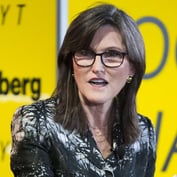Latvia’s recent adoption of the euro as its official currency will no doubt improve the country’s prospects for investment and economic advancement, but it has also highlighted, at a time when relations between Russia and the West are far from fantastic, the geopolitical battle for hearts and minds that seems to be developing in the Baltic states and in some other former republics of the Soviet Union.
Latvia has been a part of the European Union for nearly a decade, and adopting the euro means that the country can now integrate even further with the West, primarily with a view to boosting economic growth, said Nathan Rowader, director of investments and senior market strategist at Forward Management, and manager of the Forward Frontier Strategy Fund.
“Latvia views itself as a gateway between the East and the West, and prides itself on the fact that although the population is predominantly Russian speaking, they have adopted western culture,” Rowader said. “By adopting the euro, the Latvian government wants the country to become a conduit, of sorts, and the feeling is that the strength needed for that can be had by economically tying in with the West and by being more closely aligned with the West.”
The adoption of the euro is encouraging to foreign investors, Rowader said, who till date, have found it difficult to gain access to Latvia.
“It’s a small market without many investment options, but that could change as a result of the euro adoption, which will bring in more foreign direct investment and allow for greater capital access, and make Latvia a more investable country,” he said.
Eurozone membership enhances Latvia’s creditworthiness, Fitch Ratings, which affirmed the country’s triple-B-plus rating, said in a report, by underpinning economic policy coherence and credibility, improving fiscal and external financing flexibility, reducing foreign currency risks on balance sheets and giving Latvian banks access to European Central Bank liquidity facilities. The Latvian economy is closely integrated with the European Union through trade, investment and substantial ownership of its banking system through Nordic parent banks, Fitch said.
Latvia also outperforms the triple-B median on all six World Bank Governance indicators, Fitch said, the Human Development Index and Ease of Doing Business Index. And its GDP per capita is also higher than the triple-B median. To boot, Latvia, like the other Baltic States, also has a young well-educated population, Rowader said, and this is a resource that makes the country all the more attractive to investors, as it does to Russia and to the West as well. Within Latvia itself, opinions are divided on increased closeness with the European Union. The euro adoption was not a slam-dunk, and the government did not present a referendum on the issue, knowing that there has been a great deal of opposition from the people, many of whom fear a rise in prices for goods and services, as well as increased austerity measures in order for Latvia to comply with the Eurozone’s stringent criteria.








 January 13, 2014 at 08:20 PM
January 13, 2014 at 08:20 PM










